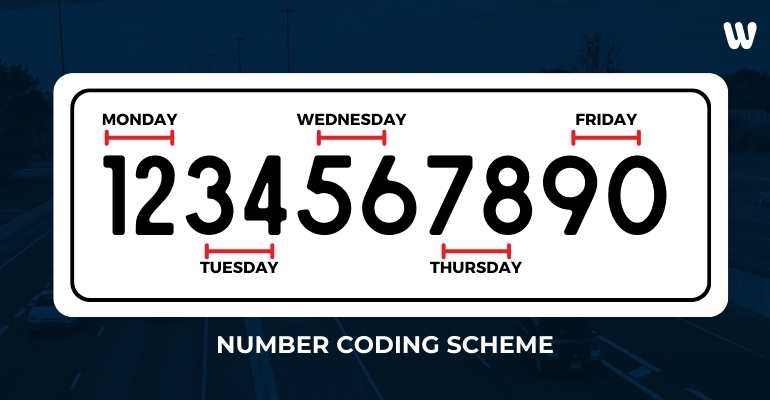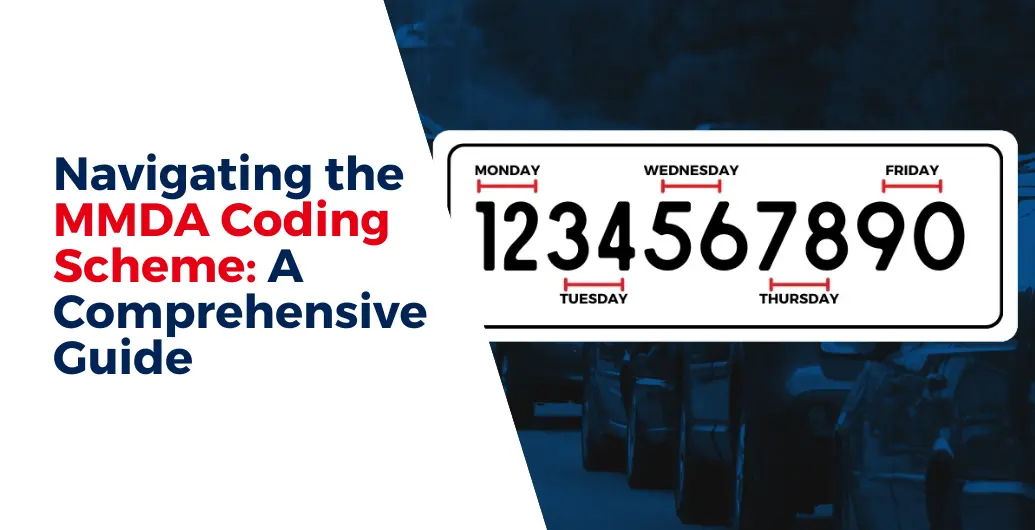The Metropolitan Manila Development Authority (MMDA) is responsible for implementing the Metro Manila Coding annually. As such, they are responsible for the coding scheme this 2024. First introduced in 1995 in response to the critical traffic conditions within the capital, the coding scheme in Manila holds the primary purpose of addressing the perennial issue of traffic congestion.
The growing development of Metro Manila in the Philippines and the spread of urbanization have led to an increase in vehicle use. The MMDA 2024 coding guidelines serve as a general measurement for managing traffic on specific days.
However, it is important to note that coding schemes are regularly undergoing adjustments to meet the recent changes and needs in mitigating growing traffic matters.
Table of contents
MMDA Coding Scheme: Overview
The coding scheme in Manila for 2024 has taken on recent updates in answering the latest traffic guidelines and potential issues within Metro Manila. The coding focuses on implementing the number coding on the vehicle’s registration. The numbers indicate the specific days that restrict the registered vehicle from entering major roads.
What Are The Window Hours in Metro Manila?
The coding window hours and scheme are active on a daily basis, with holidays and weekends being the only days of exception. The day of vehicles are restricted based on their license plate number and registration.
Here is the number coding scheme in Manila schedule from Monday to Friday:

| Day | Plate Number Ending |
| Monday | 1 and 2 |
| Tuesday | 3 and 4 |
| Wednesday | 5 and 6 |
| Thursday | 7 and 8 |
| Friday | 9 and 0 |
The 2024 guidelines coding scheme time is active and set within peak traffic hours from 7:00 AM to 8:00 PM, which are also when most people travel. MMDA and LTO have made no announcements about alterations so far.
Who is Exempted From The Coding Scheme in Metro Manila?
Certain types of vehicles fall under the exemption from falling under the number coding scheme. These include:
- Motorcycles
- Ambulances
- Fire trucks
- Police patrol
- Military vehicles on official functions
- Diplomatic vehicles
- Government vehicles in official use
- Official media vehicles
- Makati-accredited tow trucks
- Any vehicle used by medical practitioners in an emergency
- Vehicles with senior citizen Blu Card holders
Also Read: GUIDE: MVUC LTO 2024 (Meaning, Computation, and more!)
Where Does Coding Apply in Metro Manila?
The coding scheme is designed for all private vehicles from cars and motorcycles. Additionally, the scheme is implemented across all major roads in Metro Manila, including:
- Edsa
- C5
- Recto Avenue
- Quirino Avenue
- Araneta Avenue
- C6
- Roxas Boulevard
- Taft Avenue
- South Luzon Expressway (SLEX)
- Shaw Boulevard
- Ortigas Avenue
- Bonifacio Avenue
- Rizal Avenue
- Quezon Avenue
- Marcos Highway
- Del Pan
- Magsaysay Boulevard
- Aurora Boulevard
Types of Vehicles Covered
The coding scheme of 2024 still revolves around both private and public utility vehicles. However, Republic Act No. 11697 Electric Vehicle Industry Development Act (EVIDA) exempts electric vehicles (EVs) and hybrid automobiles from the coding scheme. To qualify, the vehicle’s certificate of registration should state that it’s a hybrid.
Major Roads and Thoroughfares
Authorities commonly enforce the coding scheme in Manila on major roads and thoroughfares across the area. Hence, this leads to a substantial impact on overall traffic flow within the metro.
City-Specific Information
While the coding scheme is specifically designed for traffic improvements within Metro Manila, some cities within the capital have slight variations. These cities adjust the coding system conditions to meet their local traffic pattern.
Alabang
| Coding Hours | Window Hours | Violation Fines |
| 7:00 AM-10:00 AM; 5:00 PM-8:00 PM | 10:01 AM-4:59 PM; 8:01 PM-6:59 AM the following day | ₱500 on the first offense₱750 on the second offense₱1,000 on the third and succeeding offenses |
Note: Only applicable to Ayala-Alabang National Road and Alabang-Zapote Road corner Buencamino and North Gate
Makati City
| Coding Hours | Window Hours | Violation Fines |
| 7:00 AM-7:00 PM | No window hours | Standard ₱300-₱500 fine |
Note: Makati City does exempt vehicles carrying senior citizen Blu Card holders as drivers or passengers and those under official functions and medical emergencies as stated in the Makati code.
Quezon City
| Coding Hours | Window Hours | Violation Fines |
| 7:00 AM-10:00 AM; 5:00 PM-8:00 PM | 10:01 AM-4:59 PM; 8:01 PM-6:59 AM the following day | Standard ₱300-₱500 fine |
Pasig City
| Coding Hours | Window Hours | Violation Fines |
| 7:00 AM-10:00 AM; 5:00 PM-8:00 PM | 10:01 AM-4:59 PM; 8:01 PM-6:59 AM the following day | ₱500 on the first offense ₱750 on the second offense ₱1,000 on the third and succeeding offenses |
Note: Follows the number coding scheme in Manila.
Pasay City
| Coding Hours | Window Hours | Violation Fines |
| 7:00 AM-10:00 AM; 5:00 PM-8:00 PM | 10:01 AM-4:59 PM; 8:01 PM-6:59 AM the following day | Standard ₱300-₱500 fine |
Note: Coding doesn’t apply to thoroughfares such as Domestic Road, Ninoy Aquino Avenue, MIA Road, Sales Road, parts of Airport Road, and parts of Buendia (Gil Puyat).
Paranaque City
| Coding Hours | Window Hours | Violation Fines |
| 7:00 AM-10:00 AM; 5:00 PM-8:00 PM | 10:01 AM-4:59 PM; 8:01 PM-6:59 AM the following day | Standard ₱300-₱500 fine |
Note: Follows the standardized MMDA number coding scheme.
Mandaluyong City
| Coding Hours | Window Hours | Violation Fines |
| Mandaluyong City | 7:00 AM-10:00 AM; 5:00 PM-8:00 PM | Standard ₱300-₱500 fine |
Note: Follows the standardized MMDA number coding scheme.
Manila City
| Coding Hours | Window Hours | Violation Fines |
| 7:00 AM-10:00 AM; 5:00 PM-8:00 PM | 10:01 AM-4:59 PM; 8:01 PM-6:59 AM the following day | ₱500 on the first offense₱750 on the second offense₱1,000 on the third and succeeding offenses |
Valenzuela City
| Coding Hours | Window Hours | Violation Fines |
| 7:00 AM-10:00 AM; 5:00 PM-8:00 PM | 10:01 AM-4:59 PM; 8:01 PM-6:59 AM the following day | ₱500 fine |
Note: This program takes effect on:MacArthur HighwayMaysan – Paso De Blas – Bagbaguin RoadKaruhatan – Gen. T. De Leon RoadGov. I. Santiago Road (Malinta to Tatawid)Mindanao Avenue (Barangay Ugong)East and West NLEX Service RoadT. Santiago RoadSapang Bakaw (Lawang Bato) – Punturin – Bignay Road
Taguig City
| Coding Hours | Window Hours | Violation Fines |
| 7:00 AM-10:00 AM; 5:00 PM-8:00 PM | 10:01 AM-4:59 PM; 8:01 PM-6:59 AM the following day | Standard ₱300-₱500 fine |
San Juan City
| Coding Hours | Window Hours | Violation Fines |
| 7:00 AM-7:00 PM with window hours from 10:00 AM-3:00 PM | 10:01 AM-4:59 PM; 8:01 PM-6:59 AM the following day | Standard ₱300-₱500 fine |
Note: Restricted vehicles are allowed to roam during window hours, which commence at 10 a.m. and continue until 3 p.m.
Caloocan City
| Coding Hours | Window Hours | Violation Fines |
| 7:00 AM-10:00 AM; 5:00 PM-8:00 PM | 10:01 AM-4:59 PM; 8:01 PM-6:59 AM the following day | Standard ₱300-₱500 fine |
Note: Other roads within the vicinity of Caloocan are granted the 10 AM to 4 PM window hour system, and Samson Road has been left exempt
Also Read: LIST: LTO Violations, Fines and Penalties in the Philippines
How Much is The Penalty for Coding?
Failure to follow the coding scheme times can result in penalties and measures. Strict enforcement is a means of encouraging compliance and mitigating traffic offenses. The penalty follows the standard ₱300-₱500 fine. However, some LGUs require more for violations in their area.
Changes to the MMDA coding scheme
The MMDA number coding scheme schedule and guidelines of 2024 have implemented several changes in comparison to the previous years. For instance, there are alterations to the morning and evening coding hours, including rush hours and heavy traffic scenarios.
A notable change also now exempts public utility vehicles from the revised number coding schemes. The coding focuses its priorities on commuter mobility and convenience during morning and evening coding hours.
The revised schemes aim to meet the dynamic changes in traffic and optimize the flow on Metro Manila’s roads.
Number Coding Scheme In Manila: FAQs
While the coding scheme has been applied for quite some time, some motorists still have a few questions regarding the approach to minimizing traffic congestion. Here are a few queries about it.
No, the coding scheme doesn’t apply to Skyway and other tolls run by private organizations. This also applies to the NAIA Expressway.
Yes, several navigation apps like Waze and Google Maps incorporate real-time coding updates to help motorists avoid restricted areas.
Yes, since EDSA is under MMDA’s jurisdiction. Thoroughfares only don’t follow the scheme when operated by private entities.
No, In the middle of 2022, MMDA removed the exemption of seniors and PWDs from the coding scheme.
Violators are issued electronic tickets or flagged down by MMDA officers. Motorists then have seven (7) days to settle their violation fee at the MMDA’s Redemption Center at EDSA corner Orense St., Guadalupe, Makati City.
To avoid coding, Filipinos can opt for public transportation. They can also make use of transport network vehicle services, and motorcycles.
The scheme is usually suspended during public holidays and significant national events to accommodate increased travel needs.
Violators can pay their fines via GCash to the MMDA, LTO, or LGU. This also depends on where the ticket was issued. Other payment methods include, Maya and Landbank bank transfer.
No, MMDA officers have no jurisdiction to confiscate licenses for coding violations. Only LTO officers and deputized agents can do so.
2-digit plate numbers mean that the vehicle is registered to a high-ranking government official.
Drivers with pending violations cannot renew their licenses. To do so, they should settle their existing violations before renewing their licenses.
No, as opposed to other roads and areas, EDSA has no window hours. So, vehicles that aren’t included on a specific day’s coding number, should not pass by EDSA and must look for other alternate routes.
Important Reminders for Motorists
- Know Your Schedule: Familiarize yourself with the coding schedule based on your vehicle’s plate number to avoid penalties. For example, vehicles ending in 1 and 2 are restricted on Mondays.
- Window Hours: Remember that the coding scheme is active from 7:00 AM to 8:00 PM on weekdays, so plan your travel accordingly to avoid restrictions.
- Exemptions: Be aware of which vehicles are exempt from the coding scheme, including motorcycles, emergency vehicles, and those carrying senior citizens with a Blu Card.
- Check Local Variations: Different cities within Metro Manila may have specific coding hours and regulations, so check local guidelines if you are traveling outside your usual area.
- Stay Informed: Keep up with any announcements or changes to the coding scheme by regularly checking updates from the MMDA or local government units.
- Plan Alternative Transportation: Consider using public transportation or ride-sharing services during peak hours to avoid coding restrictions and reduce traffic congestion.
Ultimately, motorists and commuters should stay informed and updated about the revised changes within the 2024 coding guidelines and the latest news from the MMDA.
By implementing a structured coding system based on vehicle registration numbers, the MMDA seeks to manage traffic flow effectively during peak hours while accommodating essential vehicles through exemptions.
By adhering to these guidelines, you can contribute to a more organized and efficient transportation system in Metro Manila.
Sources: (1), (2), (3), (4), (5), (6)
Keep Reading: LIST: LTO Restriction Codes 2024

Leave a Reply